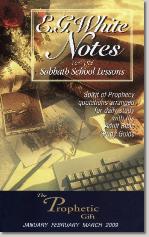|
||||||||||||||||||||
Commentary on "Interpreting the Prophetic Writings"
Day 2: Sunday, March 8, 2009
After giving a brief, lay-level, definition of the term exegesis, this lesson launches with the bold assertion, “There is no question that there will be people in heaven who never have heard the gospel”. A quote from The Desire of Ages, which borrows language from Romans 2, is given to support this statement. The Ellen White quote appears to use Romans 2 in a way which is inconsistent with the original exegetical idea of the passage. The result leaves the impression White might be suggesting that the heathen are saved because, though ignorant of the written law, they have done the things the law required.
The lesson acknowledges that the issue actually being dealt with in Romans 2 is not the salvation of the heathen, but the accountability of all, Jew and Gentile alike. The lesson further explains that it would be inconsistent with the Bible to suggest that anyone is saved by keeping the law and acknowledges all are saved by Jesus’ death on the cross.
Problems
If taken by itself, the thrust of this lesson would be difficult to discern. However, when the entire week is reviewed, Sunday’s lesson appears to set the stage for Monday when the author discusses his view of the differences between scriptural exegesis and homiletics. Therefore, the problems in the author’s assertions related to exegesis and homiletics will be discussed in Monday’s commentary.
Before leaving today’s commentary, it is worth noting that, even in laying the ground work for future lessons, underlying assumptions are present in the author’s flow of thought. The first assumption is that Ellen White’s writings are inspired and therefore can be used to support such a dubious claim as “There is no question that there will be people in heaven who never have heard the gospel”. In fact, there is considerable question about such an assertion. It is very difficult to back up this statement by scripture alone when proper exegesis is applied. Appealing to a distinction between exegesis and homiletics is no help as will be seen in Monday’s commentary.
The second assumption appears to be the author’s belief that White’s writings and the Bible will agree. So, instead of considering the possibility that White’s choice of words, and her non-contextual use of Romans 2, might indeed suggest works based righteousness, the author assumes that her words must be able to be harmonized with scripture and spends the majority of the lesson trying to do just that.
Today’s lesson further points out the poor logic introduced in Saturday’s lesson. One cannot say that an author is inspired at the same level as OT and NT writers and then claim some sort of distinction in levels of authority. The reasoning ends up being circular. If the supposedly inspired writer and the Bible appear to disagree, and yet both are believed to be equally inspired, then the adherent is forced to reinterpret the writer, the Bible, or both in order to harmonize disparate teachings. It is no good saying that the Bible has greater authority if instead of judging a prophet’s words against scripture, we merely reinterpret them to preserve our belief in the inspiration of the prophet.
Summary
- The author assumes the inspiration of Ellen White.
- The author assumes the writings of Ellen White and the Bible can be made to agree.
- The author, unintentionally, points out the impracticality of claiming that White had the same level of inspiration as biblical writers, but a different level of authority.
Copyright 2009 BibleStudiesForAdventists.com. All rights reserved. Revised March 6, 2009. This website is published by Life Assurance Ministries, Glendale, Arizona, USA, the publisher of Proclamation! Magazine. Contact email: BibleStudiesForAdventists@gmail.com.


The Sabbath School Bible Study Guide and the corresponding E.G. White Notes are published by Pacific Press Publishing Association, which is owned and operated by the Seventh-day Adventist church. The current quarter's editions are pictured above.
Official Adventist Resources
Standard Edition Study Guide Week 11
Teacher's Edition Study Guide Week 11
Easy Reading Edition Study Guide Week 11
Search the Complete Published Ellen G. White Writings
